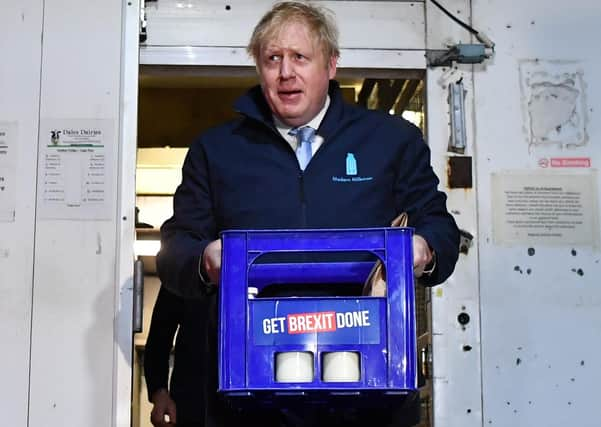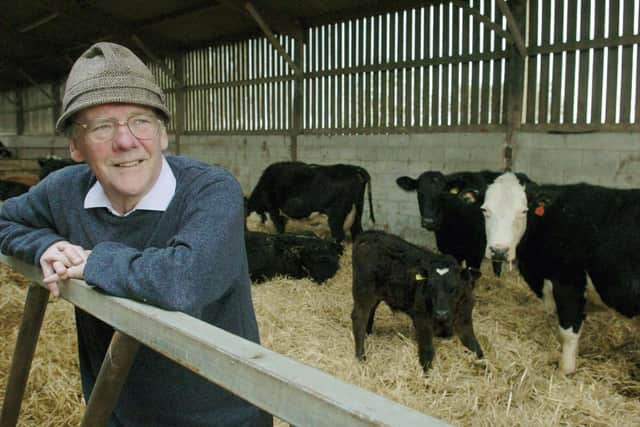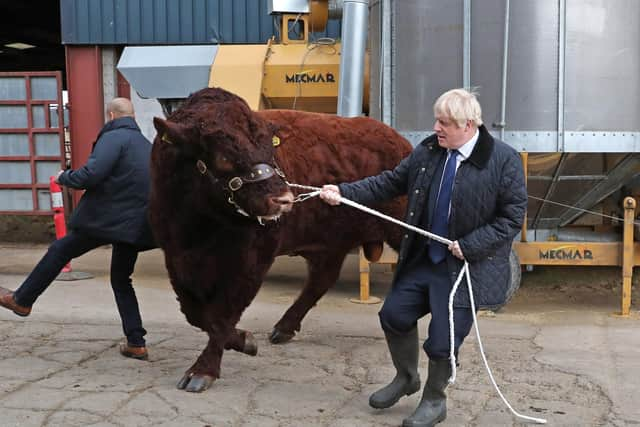Why farming’s future is at risk over Brexit trade deal with Trump’s America – Chris Haskins


Until 1845, a strong tariff barrier protected agriculture from cheap foreign competition. As a result, prices were sky high.
Wheat was £60 per ton at the end of the Napoleonic wars – a level never achieved again until 1960.
Advertisement
Hide AdAdvertisement
Hide AdBut the rapid growth of an industrial working class, which depended upon affordable food, persuaded the Conservative Prime Minister, Robert Peel, to eliminate tariffs on food imports.


By repealing the Corn Laws in 1845, he opened the British market to cheap food from North America and elsewhere. This placated a restive urban population but brought a century of hard times for farmers and land owners
German submarines in the First World War severely damaged the food supply lines from North America, bringing a temporary surge in the income of British farmers, but prices collapsed again until the commencement of the Second World War.
This time, the Government decided that a prosperous farming industry was essential for the security of the country and, in 1947, the Labour government introduced wide measures of state support for agriculture.
Advertisement
Hide AdAdvertisement
Hide AdPart of the deal, made by the French when setting up the EEC in 1957, was that farmers would benefit from extensive support and when Britain joined the EEC in 1973, the farmers were able to access these generous subsidies.


But whilst British farmers liked the subsidies, the majority of UK citizens did not because of the cost to them as consumers and taxpayers.
One key policy for Boris Johnson and the Brexiteers has been the elimination of direct subsidies to agriculture.
Another objective is to sign up new trade deals to compensate for reduced access to European markets, with a US agreement the priority.
Advertisement
Hide AdAdvertisement
Hide AdBut the US insists that any such deal must allow their farmers to have free access to British markets.
This would be disastrous for British agriculture, which is unable to compete with their counterparts in America, where loose regulation, favourable climate conditions and farm structures result in far lower costs of production than in Europe.
The Agriculture Bill, currently going through Parliament, attempts to create a programme for the industry’s future.
This would phase out direct subsidies and incentivise farmers to promote good environmental practices (I am not clear as to how such policies will compensate farmers for the loss of subsidies).
Advertisement
Hide AdAdvertisement
Hide AdSignificantly, the Government is reluctant to give legal support for the protection of existing food product standards, covering public health, safety and animal welfare.
That would suggest that these issues would be open for negotiation with the Americans which might be quickly completed, to coincide with the exit from the EU.
This would leave all the negotiating cards in the hands of the Americans who are hard negotiators at any rate – ask the Canadians!
How might British agriculture avoid returning to the deep depression it experienced from 1845-1940 if Brexit and the US trades deal were to create similar trading conditions to that era? And how can we avoid having to choose between affordable food policies and a resilient agricultural sector?
Advertisement
Hide AdAdvertisement
Hide AdThere are a number of options that could be considered post-Brexit.
First, British farming is not as competitive as it claims to be and the main reason for this is poor marketing and innovation.
Elsewhere throughout the EU, North America and Australasia, farmers co-operate extensively in the way they sell, share assets and procure.
Some degree of collaboration does exist – the pea growers of Yorkshire are a great success story, in that they share the expensive sowing and harvesting machines and pool their marketing revenue, whilst working to high quality standards, which earn a premium price in the market. But other sectors have not followed suit.
Advertisement
Hide AdAdvertisement
Hide AdMuch more can be achieved through branding. The Red Tractor Scheme, sponsored by the NFU, has helped increase domestic market shares in the branded supermarket sector but has little impact on private label and food service markets.
Post-Brexit, a statutory Milk Board could be reintroduced. The Government might also consider incentivising farmers to collaborate in the marketing of other products; cereals, meat, potatoes, fruits and vegetables which works well in most other parts of the EU and the US. One sector which the Government would be able to support is fruit and vegetables.
Because of Brexit and climate change, there should be opportunities to expand in, for example, the glass house industry, but both the industry and the Government must overcome the potential shortage of workers in a labour intensive industry.
Following the economic disaster of the Covid-19 pandemic, governments may find it necessary to support vital sectors of the economy more proactively than before – the aircraft and automobile industries being obvious examples. Should not the Agricultural Bill reflect greater interventions through this route rather than direct subsidies?
Advertisement
Hide AdAdvertisement
Hide AdIn conclusion, profound long-term implications for the industry and the country are bound up in the withdrawal from the EU.
It would be foolhardy to rush into deals with Brussels and the Americans without a proper assessment of the long-term consequences.
Sadly, impetuosity does not appear to bother Boris Johnson and Dominic Cummings, who seek deals to be agreed in weeks rather than years.
Lord Haskins of Skidby is a peer and farmer who headed Northern Foods.
Advertisement
Hide AdAdvertisement
Hide AdEditor’s note: first and foremost - and rarely have I written down these words with more sincerity - I hope this finds you well.
Almost certainly you are here because you value the quality and the integrity of the journalism produced by The Yorkshire Post’s journalists - almost all of which live alongside you in Yorkshire, spending the wages they earn with Yorkshire businesses - who last year took this title to the industry watchdog’s Most Trusted Newspaper in Britain accolade.
And that is why I must make an urgent request of you: as advertising revenue declines, your support becomes evermore crucial to the maintenance of the journalistic standards expected of The Yorkshire Post. If you can, safely, please buy a paper or take up a subscription. We want to continue to make you proud of Yorkshire’s National Newspaper but we are going to need your help.
Postal subscription copies can be ordered by calling 0330 4030066 or by emailing [email protected]. Vouchers, to be exchanged at retail sales outlets - our newsagents need you, too - can be subscribed to by contacting subscriptions on 0330 1235950 or by visiting www.localsubsplus.co.uk where you should select The Yorkshire Post from the list of titles available.
Advertisement
Hide AdAdvertisement
Hide AdIf you want to help right now, download our tablet app from the App / Play Stores. Every contribution you make helps to provide this county with the best regional journalism in the country.
Sincerely. Thank you.
James Mitchinson
Editor
Comment Guidelines
National World encourages reader discussion on our stories. User feedback, insights and back-and-forth exchanges add a rich layer of context to reporting. Please review our Community Guidelines before commenting.